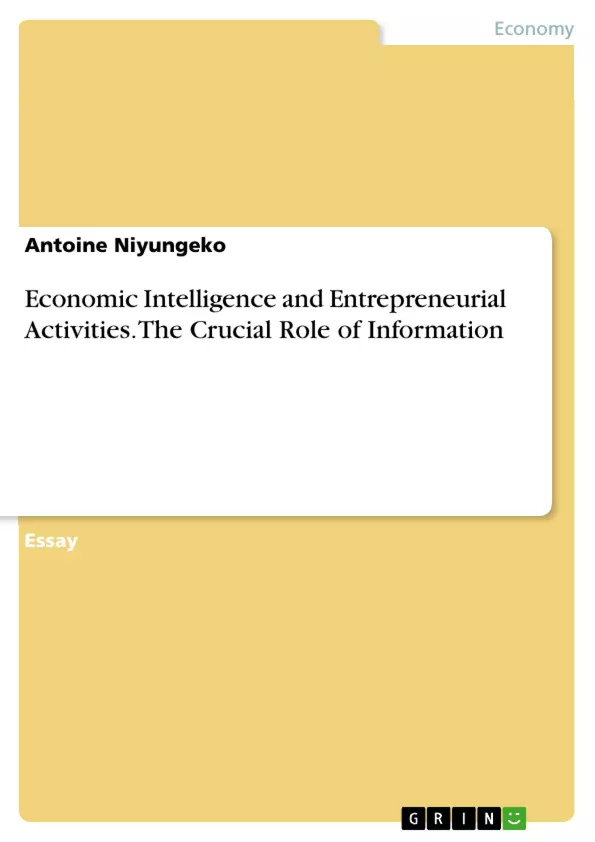This paper attempts to define economic intelligence as a stand-alone part of the overall entrepreneurial equation. It also focuses on how it does facilitate entrepreneurial processes. In business like in the army, the role of information is crucial. In wartime, all means are used to get information on the enemy, the number, his arms and his strategy and so on.
In business, information on competitors, their strengths, their weaknesses and their strategy is necessary to define his own strategy. Like in the war, it is a question on death or survival. A business can grow or fail. Having useful and timely information on a business environment (customers, suppliers, competitors, regulations, economic and social situation), helps to make a good decision and to survive and remain a competitor.
Economic intelligence is based on a competitive environment’s surveillance system of the economic agents and the actions on it, with the purpose of detecting the threats and exploiting the opportunities. Economic Intelligence aims to take advantage of the opportunity to develop better methods for the identification of relevant sources of information, the analysis of the collected information and its manipulation to provide what the user needs for decision-making.
Inhaltsverzeichnis (Table of Contents)
- Introduction
- Economic Intelligence
- Information
- Economic Intelligence in Entrepreneurial Processes
Zielsetzung und Themenschwerpunkte (Objectives and Key Themes)
This essay aims to define economic intelligence as a crucial component of entrepreneurial success and explores its role in facilitating entrepreneurial processes. It emphasizes the importance of information gathering and analysis in the business world, drawing parallels to the strategic importance of intelligence in warfare.
- The definition and significance of economic intelligence
- The role of information in decision-making and business strategy
- The application of economic intelligence in various entrepreneurial stages
- The importance of information collection, analysis, and dissemination
- The relationship between economic intelligence and entrepreneurial success
Zusammenfassung der Kapitel (Chapter Summaries)
Introduction
This introductory chapter sets the stage for the essay by defining economic intelligence as an independent aspect of entrepreneurial endeavors. It highlights the parallel between information gathering in business and military strategy, emphasizing the crucial role of information in both contexts.
Economic Intelligence
This chapter delves deeper into the concept of economic intelligence, presenting it as a system for monitoring the competitive environment and identifying both threats and opportunities. It emphasizes the importance of data collection, analysis, and manipulation to inform decision-making.
Information
This chapter explores the vital role of information in business, highlighting its diverse sources and its ability to transform into knowledge when combined with skills and experience. It emphasizes the importance of information in all phases of decision-making, from problem identification to implementation and evaluation.
Economic Intelligence in Entrepreneurial Processes
This chapter examines the application of economic intelligence within the various stages of the entrepreneurial process, including innovation, triggering events, implementation, and growth. It highlights the role of economic intelligence in identifying opportunities, developing strategies, and achieving success.
Schlüsselwörter (Keywords)
Key concepts explored in this essay include economic intelligence, entrepreneurial processes, information gathering, decision-making, competitive analysis, data analysis, business strategy, and entrepreneurial success.
Frequently Asked Questions
What is economic intelligence in a business context?
Economic intelligence is a system for monitoring the competitive environment to detect threats and exploit opportunities through data collection and analysis.
Why is information crucial for entrepreneurs?
Information on competitors, customers, and regulations is essential for defining a strategy and ensuring the survival and growth of a business.
How does economic intelligence relate to military strategy?
Like in warfare, business intelligence involves gathering data on the "enemy" (competitors) to make informed tactical and strategic decisions.
What are the main stages of the entrepreneurial process covered?
The process includes innovation, triggering events, implementation, and growth, all of which rely on effective economic intelligence.
What is the goal of a surveillance system in business?
The goal is to identify relevant information sources and manipulate data to provide actionable insights for decision-making.
- Quote paper
- Antoine Niyungeko (Author), 2020, Economic Intelligence and Entrepreneurial Activities. The Crucial Role of Information, Munich, GRIN Verlag, https://www.grin.com/document/956963



